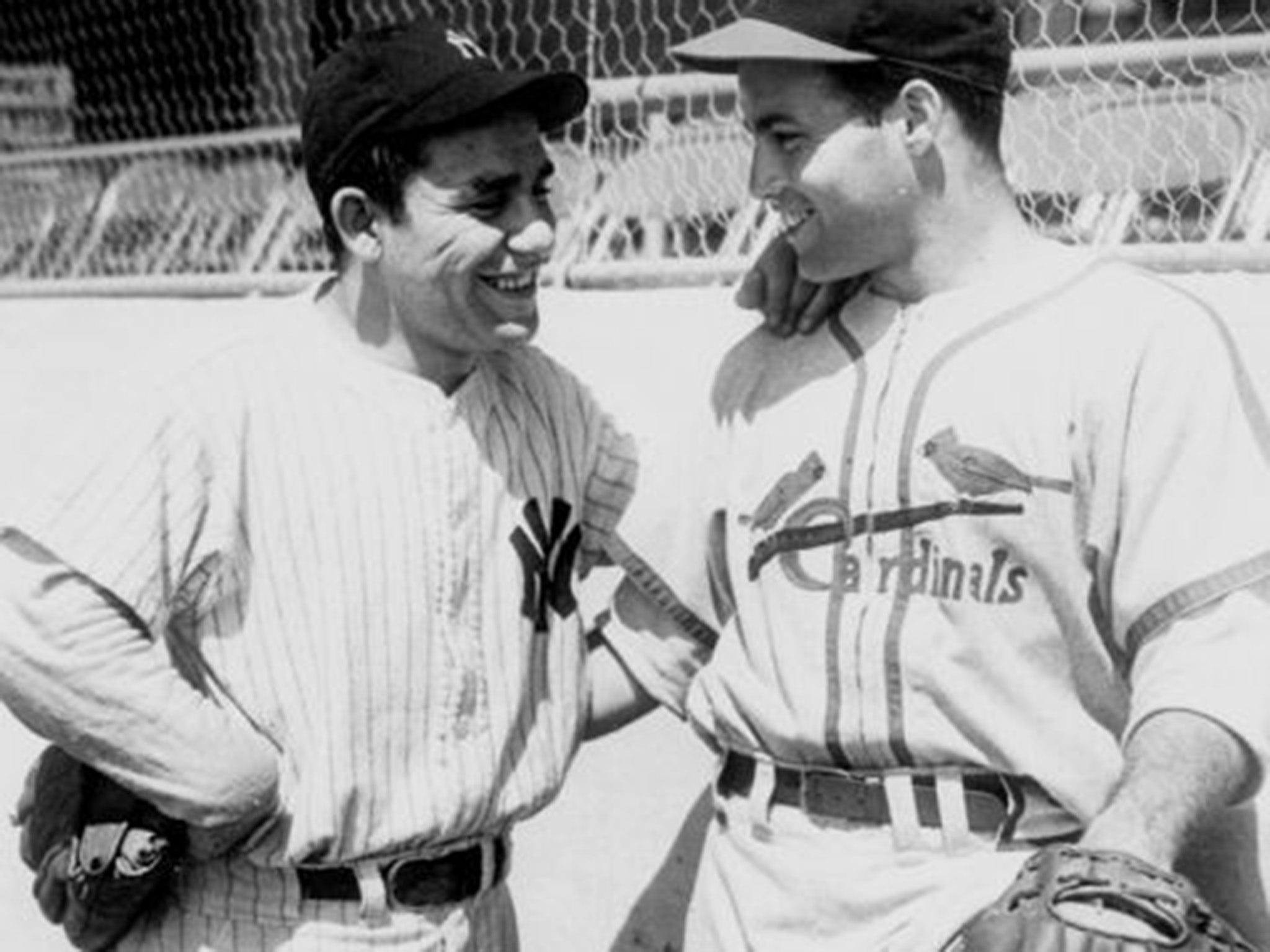Baseball: Yogi and Joe came across as two regular guys at the game but were American icons
Both were catchers – a role, mute and masked, that demands an animal flair for communication

When Yogi Berra moved, he gave Joe Garagiola directions to his new house. “When you come to a fork in the road,” he said, “take it.” With Yogi, his face so open, it always took a moment or two to register what he had said. “Uh-huh, OK Yogi.” And then Joe would pull up, shaking his head, laughing: “Now wait a minute.”
Yet even as the words fell apart, you somehow ended up with a clearer glimpse at the meaning. There was always a limpid residue of rationality. In this instance, Joe was being told that it didn’t matter whether he went right or left: both roads would bring him to Yogi’s place. And it was the same with so many of the lines attributed to one of baseball’s great characters: every fork in the road of logic required a double take, but would almost invariably turn into a short cut. “Nobody goes there anymore,” he is reputed to have said of a restaurant. “It’s too crowded.”
As kids, during the Depression, they lived opposite each other in The Hill, an Italian precinct of St Louis: Joe at No 5,446, Yogi at No 5,447. Their fathers worked on building sites, and spoke only the language of the old country. In their different ways, however, the two boys would master the cultural currency of America with a unique felicity.
Both were catchers – a role, mute and masked, that demands an animal flair for communication. But the ultimate trajectory of their respective careers was transposed when Joe signed for the Cardinals as a teenager, for $500, and won the 1946 World Series in his first major league season; while Yogi refused to sign, having been offered only $250. He would end up on $65,000 a year, a Yankees legend, whereas Joe never made more than $12,000. One rainy night in St Louis, he broke his shoulder tripping over Jackie Robinson’s legs. By the time he quit, he had been traded more often, in the flesh, than his bubble-gum card in the schoolyard.
But when Joe died, on Wednesday, he was mourned as an institution of the game, commensurate with his Hall of Fame pal. He was 90 – the same as Yogi, when he went last September. Joe’s switch to the broadcasting booth, in 1954, proved so successful that by 1968 he even interviewed Lennon and McCartney as guest host of The Tonight Show; not to mention Tallulah Bankhead, who flirted with the lads through a mist of bourbon. (Poor thing. People would stop her in the street and ask: “Aren’t you Tallulah Bankhead?” “I’m what’s left of her, dahling.”)
Joe became one of the definitive American voices of the television age. Paradoxically, though he owed his initial eligibility to professional insight, he thrived sooner for a natural affinity with the man in the street. He duly made a comic virtue of his mediocrity as a hitter, and disdained the showy virtuosity of the professional announcers. “I want the broadcast to sound like two guys sitting at the ballpark, talking about the game, with the viewer eavesdropping,” he said. “It’s not High Mass, and it’s not a seminar — it’s a ballgame.”
And that’s what those old guys used to do for the fans: they came across as though they lived across the street, just like Joe and Yogi all those years ago. Nowadays sport’s big shots tend to be blanched of all humanity, their headphones tuning out everything except the siren call of corporate agents and lingerie models. Compare these silhouettes with Joe, with his candid bald pate, laughing at himself, laughing at Yogi. For a time, true, Yogi resented Joe caricaturing him as some kind of idiot savant, as though serial pennants as player and coach could be found as serendipitously as wisdom itself. But in the end he was grateful: everyone felt they knew Yogi like a guy on the next stool at the bar, another head twisted towards the game: this rough-hewn, shambling bear, nose and lugs and jawbone thrown together like a kid’s felt-pen sketch. And he’d turn to you deep in the ninth, and you’d suddenly be drowning in those dark twin weirs of humour, and he’d say: “It’s déjà vu all over again.” (If his authorship of this one was contested – well, he’d been there before.)
That’s how we love our sporting idols: not exalted by some arcane vision or craft but standing right next to us, bringing us into the drama as faithfully as they would get their round in. That’s why we tune into the radio, why we read our sportspages. Barack Obama wasn’t even born in 1955 but the picture of Yogi doing his nut with the umpire, who had given Robinson home safe in the World Series, is so embedded in national memory that Yogi could send him one half a century later, signed simply: “Dear Mr President. He was out!” Yogi, for his part, was out there. Joe and Yogi, on our wavelength, just regular guys. We flatter ourselves, obviously. Yogi won a Purple Heart in France. But at least they let us tilt the mirror and pretend.
Subscribe to Independent Premium to bookmark this article
Want to bookmark your favourite articles and stories to read or reference later? Start your Independent Premium subscription today.

Join our commenting forum
Join thought-provoking conversations, follow other Independent readers and see their replies